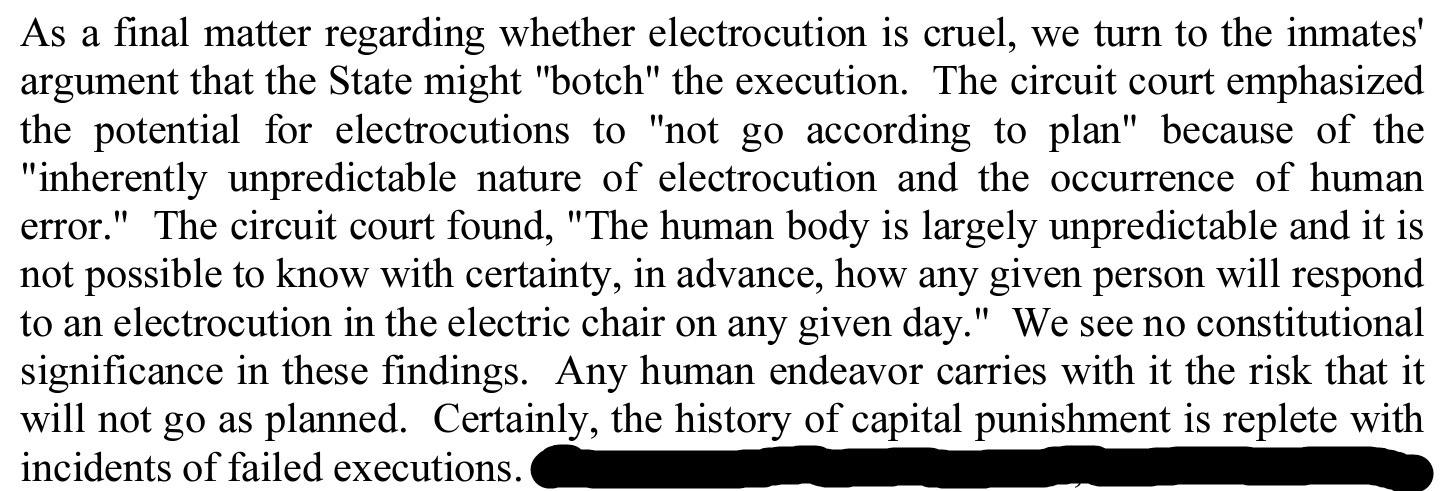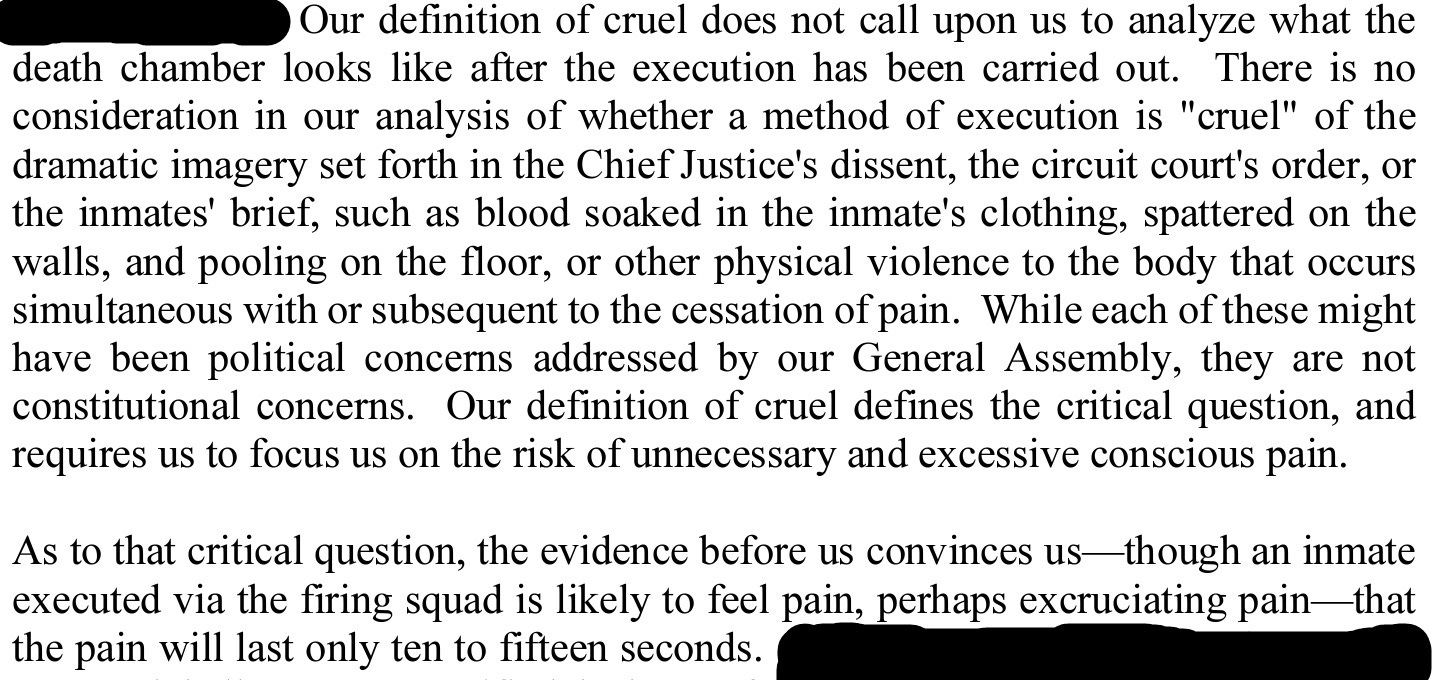Will The Michigan Supreme Court Ban Death By Incarceration? Another big win, a docket full of “cruel or unusual” cases, and a strong state rights tradition all signal a right to redemption
In another win for state constitutional rights, the Michigan Supreme Court last week held that requiring someone without any sex-related convictions to register as a sex offender—something that, remarkably, most states do to some extent—violates the state’s ban on “cruel or unusual” punishment. Central to the ruling were both the text of Michigan’s antipunishment clause—which, with its disjunctive formulation, is broader than the federal 8th Amendment’s “cruel and unusual” prohibition—and the state’s tradition of prioritizing rehabilitation as the primary goal of criminal sentencing.
Subjecting people “who did not commit a sexual offense” to the “social stigma and law-enforcement supervision” that comes with sex offender registration “does not address the underlying causes of [their] conduct or support [their] reintegration as a noncriminal member of society,” the court said. In fact it does the opposite, by “preventing [people] from securing employment and otherwise moving forward with … life plans.”
The ruling in People v. Lymon will free about 300 people from the sex offender registry. Beyond that, it further cements the Michigan Supreme Court as a national leader in building state antipunishment jurisprudence and expanding rights against extreme and needless punishments. And that trend should continue: There are at least seven cases pending on the court’s docket that raise claims under the “cruel or unusual” clause, all touching on a common theme: will the court further limit lifetime punishments that, contrary to the state’s long constitutional history, “forswear[] altogether the rehabilitative ideal”?
“Rehabilitation is a specific goal of our criminal-punishment system,” the court said in Parks. “Indeed, it is the only penological goal enshrined in our proportionality test as a criterion rooted in Michigan’s legal traditions.”
Since 1962, when the U.S Supreme Court held that the 8th Amendment applies to the states, most state supreme courts have largely neglected their own antipunishment clauses, opting to apply only federal law instead. Rather than develop their own case law based on the independent meaning of their own constitutions, they have treated U.S. Supreme Court precedent as the final word, “lockstepping” with every 8th Amendment decision.
But the Michigan Supreme Court has long been an exception. In 1972, the court explained that the state’s “cruel or unusual” clause demands independent analysis, one that at least considers “the goal of rehabilitation.” Twenty years later, in a case called People v. Bullock, the court used that approach to ban mandatory life without parole (or, “death by incarceration”) sentences for drug possession—a holding directly at odds with what the U.S. Supreme Court said just one year before. In Bullock, the court explained that different constitutional text, unique state history, and “longstanding … precedent,” provided “very compelling reason[s] not to reflexively follow the latest turn in” federal 8th Amendment case law, and to instead apply “the Michigan Constitution more expansively.” In particular, the court emphasized “the goal of rehabilitation” as a constitutional mandate “rooted in Michigan’s legal traditions.”
At the same time, though, a tension emerged between Michigan’s constitutional law and its sentencing practices. While Michigan’s constitution provided greater rights against excessive punishment and embodied, in its anti-cruelty prohibition, a constitutional mandate to rehabilitate, the state also became a world leader in sending people to die in prison. By 2020, Michigan imprisoned 5,600 people on some form of life term, including nearly four thousand without the possibility of parole—the fifth most of any state in the country.
But in 2022, the Michigan Supreme Court revived its “cruel or unusual” jurisprudence with a series of rulings that protected youth and young adults from lifelong prison terms. In People v. Parks, the court banned mandatory life without parole sentences for people 18 and younger (raising the age under federal law by one year); in other cases it banned all life sentences for youth convicted of second degree murder and specified that there is always a presumption against life without parole sentences for youth—one that prosecutors must overcome with specific evidence. In each case, Michigan’s constitutional commitment to rehabilitation was central. “Rehabilitation is a specific goal of our criminal-punishment system,” the court said in Parks. “Indeed, it is the only penological goal enshrined in our proportionality test as a criterion rooted in Michigan’s legal traditions.”
With last week’s decision in Lymon, the court reaffirmed and built on these cases, and it’s poised to do more in the next year. The court’s docket includes more challenges to Michigan’s draconian sex offender registration law, including claims that lifetime sex offender registration and lifetime electronic monitoring constitute “cruel or unusual” punishment. It will also consider further limits on death-by-incarceration sentencing—a practice that is by definition incompatible with rehabilitation. It could apply Parks retroactively, to people with final convictions, and to all people under age 21; ban all life without parole—mandatory or discretionary—for youth under 18; and ban mandatory life without parole for people convicted under the so-called “felony murder rule”—an archaic legal doctrine that allows murder convictions and the most severe punishments even when there is no intent to kill.
Collectively, these cases could restore hope to thousands—more than 1,000 people are serving life without parole for felony murder alone. But they also raise a question: Will the court ultimately do with one clear holding what it has started to do piecemeal? Will it recognize that, whatever their crime or age, sending people to die in prison without even the hope of release is cruel and conflicts with fundamental state constitutional rights? This year the Massachusetts Supreme Judicial Court made history by banning all life without parole sentences for anyone under age 21. The Michigan Supreme Court could be the first to ban them entirely.
South Carolina Supreme Court Upholds Death By Firing Squad & Electrocution
In a surreal and chilling opinion, the South Carolina Supreme Court last week upheld both the firing squad and electric chair as valid execution methods.
South Carolina’s constitution bans punishments that are any or all of “cruel,” “unusual,” or “corporal,” and in 2022 a trial court ruled that the state’s death penalty statute is all three. Based on scientific and medical evidence, the trial court detailed the gruesome and often torturous reality of killing people by these methods (particularly in South Carolina, where the state quickly cobbled together a firing squad protocol from “the internet”). “In 2021, South Carolina turned back the clock and became the only state in the country in which a person may be forced into the electric chair if he refuses to elect how he will die,” the court wrote. “In doing so, the General Assembly ignored advances in scientific research and evolving standards of humanity and decency.”
The trial court’s order was hardly radical. In 2008, the Nebraska Supreme Court held that the electric chair violates its state constitution because “electrocution inflicts intense pain and agonizing suffering,” and, “examined under modern scientific knowledge, … has proven itself to be a dinosaur more befitting the laboratory of Baron Frankenstein than the death chamber of state prisons.” This followed a similar Georgia Supreme Court ruling in 2001, which noted that the electric chair “unnecessarily mutilate[s] or disfigure[s] the condemned inmate’s body.”
The South Carolina Supreme Court’s opinion reversing the trial court, and declining to follow the state supreme courts in Nebraska and Georgia, stands out for a few reasons. Most notable is the majority’s indifference toward and almost clinical description of the human suffering that will result. The near-inevitability of “botched” executions, for example, is of “no constitutional significance” to the court:

And here is the court ignoring—despite an explicit constitutional ban on “corporal” punishments—bodily mutilation while observing that “excruciating pain” will last “only” 15 seconds:

In a partial dissent, Chief Justice Don Beatty also noted that the majority appears to nonsensically reduce state constitutional rights even below what the 8th Amendment provides. In particular, he criticized the court for refusing to consider the “evolving standards of decency,” long-recognized as relevant to death penalty litigation, under the state constitution. This makes no sense, he argues, given the basic textual differences. An antipunishment clause that prohibits “cruel,” or “unusual,” or “corporal” punishments cannot be narrower than one that prohibits only “cruel and unusual” punishments. But more than that, federal rights provide a “floor” of civil rights protections that state courts can only enhance, not reduce:
In my view, holding this Court will not apply evolving standards of decency for state claims is illogical. Inmates should not be required to allege an Eighth Amendment violation to obtain the fullest measure of protection afforded under state law. More importantly, however, rejecting consideration of the evolving standards of decency when determining the limits of acceptable punishment results in our state constitution affording notably less protection to its citizens, not an additional layer or greater level of protection. This arbitrarily places South Carolina’s level of protection beneath the minimal “floor” required by the United State Constitution—lowering it to the basement.
[Full State Supreme Court Opinion | Full Trial Court Opinion]